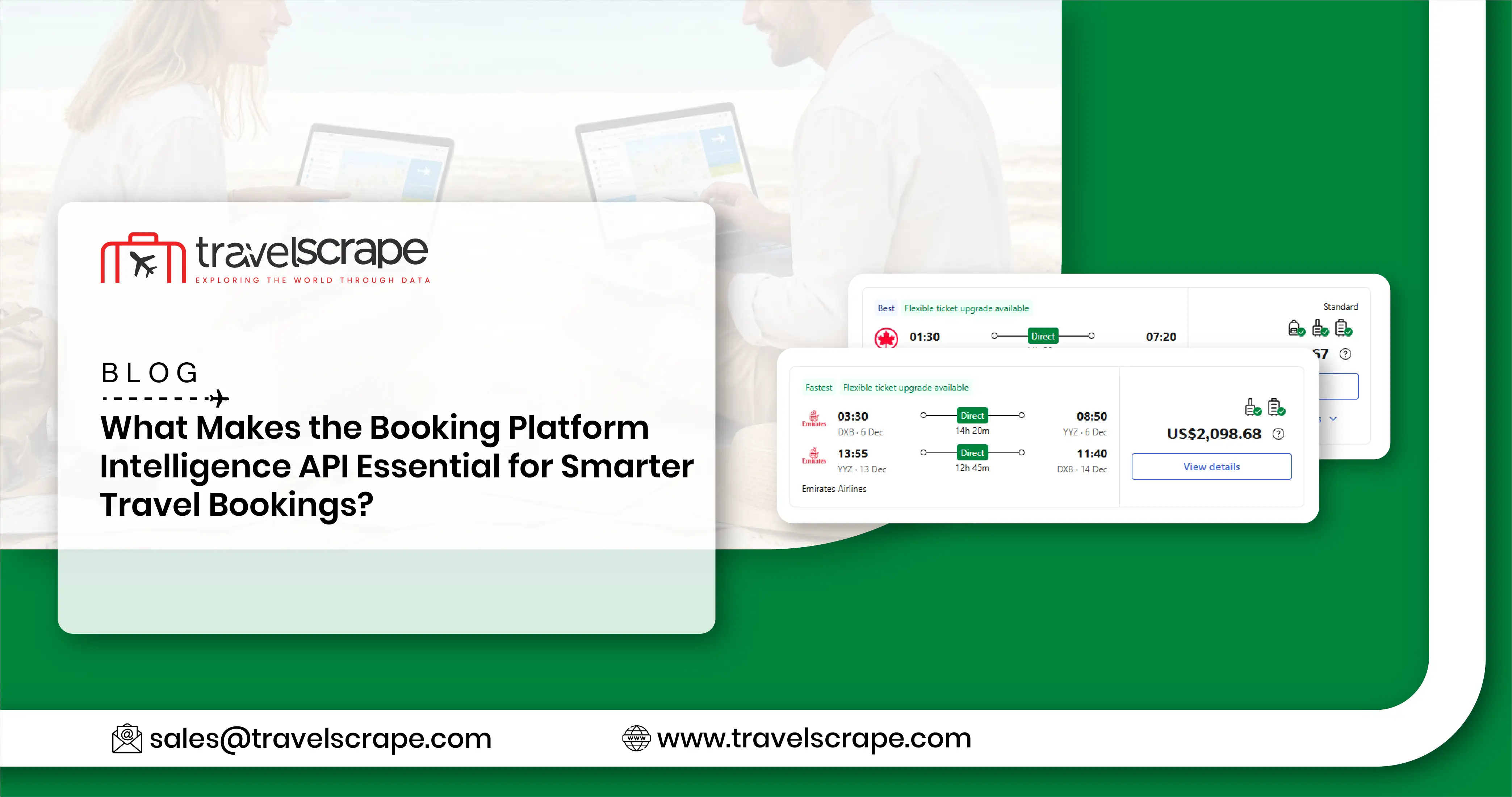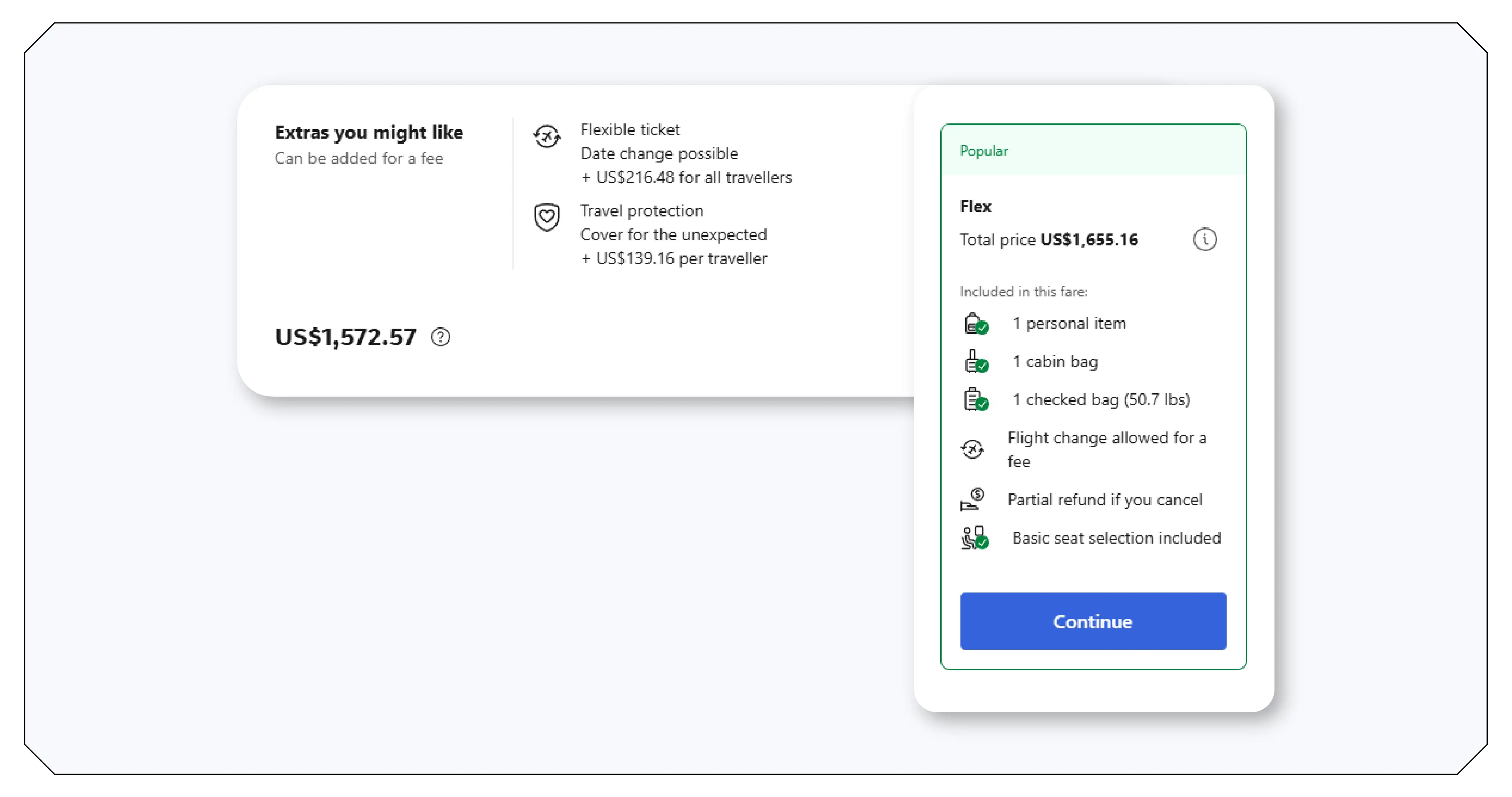What Makes the Booking Platform Intelligence API Essential for Smarter Travel Bookings?

Introduction
The modern travel industry is undergoing a profound transformation powered by automation, data scraping, and AI-driven intelligence. As travelers increasingly seek personalized experiences, speed, and transparency, booking platforms are evolving into sophisticated data ecosystems. Central to this shift is the Booking Platform Intelligence API, a tool that allows travel companies to gather, analyze, and act on real-time information.
By integrating advanced APIs with Travel & Tourism Datasets, online travel agencies (OTAs) and startups can deliver instant search results, accurate pricing, and intelligent recommendations. This technological backbone ensures that travelers see the best deals, while businesses gain a deeper understanding of market behavior.
At the heart of these innovations lies Travel Booking Platform Intelligence, which combines data extraction, analytics, and dynamic pricing to optimize both user experience and revenue management. Platforms that harness this intelligence are redefining how travel decisions are made—replacing guesswork with predictive analytics and real-time market insights.
The Role of APIs in Building Smarter Travel Ecosystems

APIs (Application Programming Interfaces) act as the nervous system of modern booking platforms. They enable different systems—airlines, hotels, car rentals, and tour operators—to communicate seamlessly. Through Travel Data Intelligence Solutions, APIs aggregate vast amounts of structured information from hundreds of sources, from global distribution systems (GDS) to metasearch engines.
Low-latency API integration ensures that booking engines can instantly respond to user queries with accurate pricing and availability. For example, when a traveler searches for a flight from London to Dubai, the system retrieves live rates, compares offers from multiple suppliers, and displays optimized options within seconds.
This speed is critical. A delay of even a few seconds can impact conversion rates and user satisfaction. Therefore, travel brands rely on APIs that not only fetch data quickly but also process it intelligently—filtering results by user preferences, loyalty programs, and historical behavior patterns.
How Dynamic Pricing Intelligence Shapes Travel Platforms?
Dynamic pricing is now the beating heart of digital travel commerce. Airlines, hotels, and car rentals all adjust their rates dynamically based on demand, seasonality, competitor activity, and booking behavior. With the Travel Booking Platform Pricing API, businesses can automate this complex process and maintain price competitiveness across markets.
Dynamic pricing engines powered by APIs analyze millions of data points in real time. They factor in elements like remaining seat inventory, user search frequency, event-based demand surges, and even weather forecasts. This allows platforms to recommend not only the best prices but also the optimal booking time for users.
Such systems use machine learning to continuously refine pricing models. The more data the API collects, the more accurate its predictions become. For OTAs and travel startups, this means the ability to offer intelligent discounts, detect price anomalies, and maximize profit margins without manual intervention.
Competitive Intelligence: Understanding Market Movements
The travel industry thrives on competition, and understanding competitor pricing behavior is key to maintaining market share. Through Travel Scraping API Services, businesses can monitor real-time prices across rival platforms and uncover emerging patterns.
This data enables OTAs to benchmark their offerings against market averages, ensuring that pricing strategies remain competitive yet profitable. For instance, a hotel aggregator might discover that weekend rates for a specific destination drop sharply after Wednesday. Using this insight, the platform can promote early-week bookings or highlight last-minute discounts to drive conversions.
Competitive intelligence APIs also allow travel brands to identify gaps in product offerings, such as unavailable routes, outdated deals, or underrepresented travel packages. This not only enhances the booking experience but also strengthens customer retention through timely and data-backed recommendations.
Low-Latency Integration for Instant Results
In the world of digital travel, speed equals trust. APIs that support low-latency data exchange ensure travelers always see accurate and up-to-date prices. A single delay or mismatch between displayed and final prices can result in cart abandonment and lost revenue.
By leveraging scalable API infrastructures, OTAs can maintain real-time synchronization between suppliers and booking interfaces. Low-latency systems also enable smoother personalization—displaying prices in local currencies, adapting to user devices, and supporting high-traffic scenarios such as holiday sales.
Furthermore, modern travel APIs employ caching strategies that minimize load times while maintaining data freshness. This makes it possible to deliver global booking results within milliseconds, regardless of the user’s location.
How Dynamic Pricing Intelligence API Enhances Personalization?
Personalization has become a key differentiator in travel booking experiences. The Dynamic Pricing Intelligence API enables platforms to tailor recommendations based on user profiles, search intent, and historical preferences. For example, returning users may receive loyalty discounts, while first-time visitors might be offered flash deals.
These APIs analyze behavioral data—such as frequently searched routes, preferred airlines, or favorite travel dates—and apply predictive models to anticipate user needs. In practice, this allows booking systems to display the most relevant offers upfront, improving engagement and conversion rates.
By combining dynamic pricing with personalization, travel companies can shift from static catalogs to responsive, data-aware platforms that evolve with each user interaction.
Real-Time Travel Data Scraping for Market Awareness
The global travel landscape changes minute by minute. Real-time data scraping enables businesses to remain agile in this constantly shifting market. Through Real-Time Travel Data Scraping, companies can capture live updates on airfare changes, hotel room availability, and rental car pricing directly from source websites and partner APIs.
This real-time data flow supports advanced use cases such as fare prediction, competitor benchmarking, and demand forecasting. Travel startups, in particular, benefit from integrating these datasets into AI-driven dashboards that highlight price drops, route opportunities, and trending destinations.
For large OTAs, continuous scraping ensures the integrity of pricing data displayed to customers—building trust and eliminating discrepancies that could lead to negative booking experiences.
Why Travel Startups Are Adopting Data-First Strategies?
Startups in the travel ecosystem are embracing data-first strategies to compete with established players. Instead of building static systems, they rely on dynamic APIs that offer flexibility, automation, and scalability. By embedding Travel Price Intelligence for Dynamic Pricing into their platforms, startups can optimize pricing in real time, reducing manual intervention and enhancing responsiveness.
Moreover, access to real-time market intelligence levels the playing field. With API-driven automation, even small travel platforms can analyze global datasets, predict price fluctuations, and offer competitive deals comparable to larger enterprises. This democratization of data has redefined what it means to compete in the travel sector.
The Future of Travel Booking Platforms: Predictive and AI-Powered
The future of travel booking lies in predictive analytics and autonomous pricing systems. APIs will increasingly collaborate with artificial intelligence to deliver hyper-personalized and dynamically priced travel experiences.
Predictive models will assess a traveler’s intent before they even search, offering proactive deals and curated itineraries. Similarly, sentiment analysis and real-time market intelligence will help platforms fine-tune promotions based on social media trends, weather patterns, and flight occupancy data.
In this context, APIs are not just data connectors—they are enablers of continuous intelligence, ensuring that travel ecosystems remain adaptive and customer-centric.
How Travel Scrape Can Help You?
- Real-Time Market Monitoring: Gain instant access to updated pricing, availability, and demand trends from global travel platforms to stay competitive and responsive.
- Customized Data Extraction: Collect precisely the information you need—flights, hotels, rentals, or reviews—tailored to your business requirements and preferred data formats.
- Competitor Intelligence: Track competitor pricing, discounts, and offers in real time to refine your own dynamic pricing and promotional strategies.
- Scalable API Integration: Seamlessly integrate our scraping APIs into your existing systems for automated, high-volume data collection without manual effort.
- Actionable Travel Insights: Transform raw data into valuable analytics that power smarter decision-making, personalized recommendations, and enhanced user experiences across your platform.
Conclusion
As digital travel continues to evolve, the integration of Web Scraping for Travel Price Insights and dynamic APIs will define the next generation of booking experiences. Data scraping complements APIs by capturing unstructured market data that APIs alone cannot access, creating a holistic view of global pricing.
When businesses Extract Competitive Travel Pricing Data, they gain actionable intelligence that supports automated decision-making and transparent pricing. This synergy between APIs and scraping technologies ensures that travel platforms deliver accurate, real-time, and personalized results at scale.
Ultimately, understanding APIs vs Web Scraping Travel Data empowers businesses to blend both strategies—leveraging APIs for structured, high-speed integration and scraping for deeper market visibility. Together, they form the backbone of intelligent, data-driven travel ecosystems that elevate user experience and redefine pricing transparency.
Ready to elevate your travel business with cutting-edge data insights? Scrape Aggregated Flight Fares to identify competitive rates and optimize your revenue strategies efficiently. Discover emerging opportunities with tools to Extract Travel Website Data, leveraging comprehensive data to forecast market shifts and enhance your service offerings. Real-Time Travel App Data Scraping Services Services helps stay ahead of competitors, gaining instant insights into bookings, promotions, and customer behavior across multiple platforms. Get in touch with Travel Scrape today to explore how our end-to-end data solutions can uncover new revenue streams, enhance your offerings, and strengthen your competitive edge in the travel market.